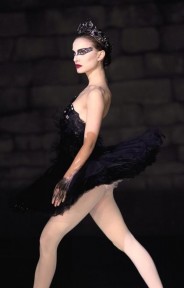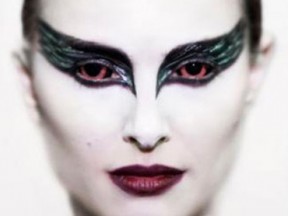 No one uses the SnorriCam (a camera contraption rigged to an actor’s body) like Darren Aronofsky or can plumb actors to scrape their gut for a life-changing performance like he does. Natalie Portman’s Nina in Black Swan is not a character you see from a distance. You inhabit her and she inhabits you. Her skeletal body, her impossibly poignant dancing and flawed, fractured soul are triumphant achievements for any actor. And what she creates is possibly one of the most unnerving experiences of our life. Her face is in extreme proximity to us.
No one uses the SnorriCam (a camera contraption rigged to an actor’s body) like Darren Aronofsky or can plumb actors to scrape their gut for a life-changing performance like he does. Natalie Portman’s Nina in Black Swan is not a character you see from a distance. You inhabit her and she inhabits you. Her skeletal body, her impossibly poignant dancing and flawed, fractured soul are triumphant achievements for any actor. And what she creates is possibly one of the most unnerving experiences of our life. Her face is in extreme proximity to us.
When she walks, we walk with her and when the chasms in her psyche begin to widen, we fall right through them. She is all the time who we are on certain days of extreme isolation. Days when we feel trapped in frozen, constricting boxes and watch the world and its living, breathing, joyous beings from a distance. If the film achieves anything, it is this that there is no comforting distance between the slow burning horror inside Nina and us. She won’t let you run and hide from her neurosis. So when she sees grotesque paintings crying out, mirror images making eye contact, feels the raw scratches on her shoulders, tries to mend bloody nails, gingerly touches bruised ballet toes..you are right there, revolted maybe, but there.
And once you start contextualising Nina’s free-fall into hysteria, you realise that the multiple mirror images she sees staring back at her are not incidental. They represent the many selves we mutate into when our desire to transcend our limits and rise above the benchmarks of our peers and the negativity of our rivals begins to take away from us, our own inviolability. Nina is violated again and again. By her own desire to inflict pain upon herself, by the extreme protectiveness of her mother Erica (Barbara Hershey), by her ballet director Thomas (Vincent Cassel) who wants to supposedly awaken her repressed sexuality.
Nina is on her way to ballet super stardom, having been chosen to play the lead in Swan Lake. Her ambition is not a radiant, happy thing. It is gnawing, painful, fearful, desperate, lonely desire to reach an impossible pinnacle. This pinnacle is perfection and also its mirror image, damnation. The kind that the unceremoniously ousted ballerina Beth (Winona Ryder) is suffering.
Beth is everything Nina aspires to be and fears. She wants to have everything Beth has, including her used lipstick, her make-up room, even her nail file but she also is repelled and drawn to the wreck that Beth is now. A bitter, destroyed woman with broken legs and a broken spirit. There is also her rival Lily (an absolutely compelling Mila Kunis) who is drawing Nina out of her frigidity and plunging her also into self-doubt and hysteria. So she begins to drift between her need to excel, her fear that Lily will somehow steal her role and becomes increasingly obsessed with the divergent roles of the virginal Princess Odette and her pathologically dark twin Odile, the black swan. Her inability to unite the black and white aspects of her psyche and her insecurities lead to a murder close to the climax.
Only it is not. It is a final act of mutiliation that Nina must inflict upon herself to live that one moment she has hungered for. A moment perfect enough to die for. That moment when everyone is on their feet, the lights are blazing white and nothing exists before or beyond. Great premise. Disconcertingly great Portman but the problem I have with the film is that it increasingly becomes self-indulgent and macabre.
It gets more and more difficult to watch as fingers get smashed, hallucinations become darker and grosser, even a nail file becomes a weapon of mutilation, legs with seams of stitches are shown in a close-up and more. The woman can’t even take a bath without an episode and slowly, from the realm of real psychological horror, the film descends into what a friend describes is the newly coined genre of a “ballet slasher.” There is a dearth of great writing so the line that stands out is,”Perfection is not just about control but about letting go.” Perfection is also about knowing when to hold back and this is where Aronofsky fails as he goes all out trying to drum horror into your being when a suggestion would have worked better.
The final moments redeem the film when Nina peaks as a performer and you walk out with the realisation that it is not just the death of our dreams that destroys us. Sometimes it is their coming to life that is impossible to bear.
Reema Moudgil is the author of Perfect Eight. (http://www.flipkart.com/perfect-eight-reema-moudgil-book-9380032870) . More on Story Wallahs. Also check other books by Unboxed Writers in our Store.







Wow! Am confused whether or not to watch …
Wow. Now I absolutely have to see it !
Love your description of the characters and the manifestation of their own ambition & insecurities!!
Slick review! Well written, Reema.
Now I am back to being in two minds about this film!
I have heard so much about the movie and been wanting to watch it. I quite liked “requiem for a dream” too, and admire directors as well as performers who are able to take the viewers into a roller coaster ride of the human psyche.
I just watched the film and found it quite extreme in exactly the way described here.
It is interesting that the supposed “bad” person or antagonist (Lily) in the film, turns out to be pretty much the only one approaching her with honest intentions.
I have to say I agree with your sense of the arc of the film, I found the early parts far creepier than the end, which laid it on a bit too thick.
I also liked the final scene and that the film kept you guessing as to the status of things until the end, and I liked very much that it laid bare the dynamics of desire and manipulation so clearly.